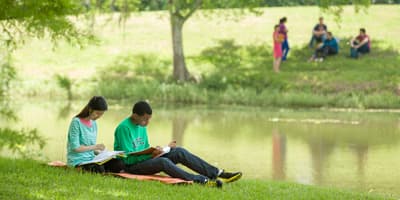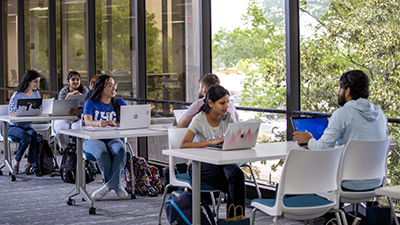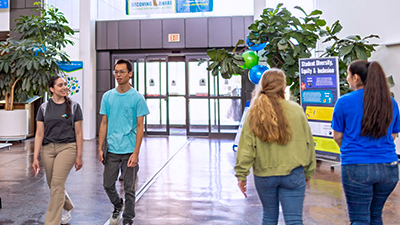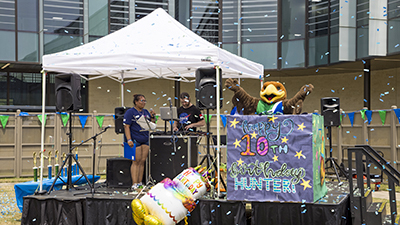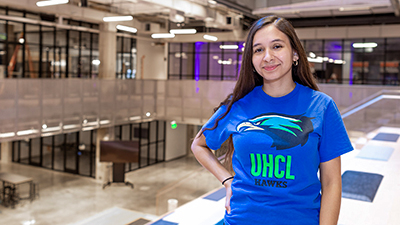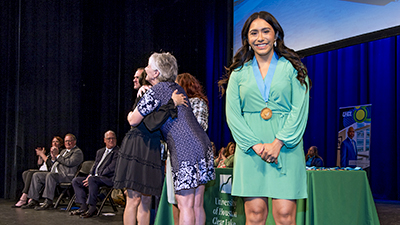Mentorship program helps equip high school students for psychology-related careers

Recent demographic data collected by the Behavior Analyst Certification Board reveals an underrepresentation of people of color in the field of behavior analysis at the master’s and doctoral levels. This finding inspired Dr. Sarah Lechago and two former graduate students, Brianna Banks and Jennifer Nguyen, to act. Together, they developed and introduced a high school mentorship program as a component of Lechago’s Behavior Analysts for Diversity, Inclusion, and Equity (BADIE) research lab at University of Houston-Clear Lake (UHCL).
Lechago has worked as an associate professor in UH-Clear Lake’s Behavior Analysis master’s program in the College of Human Sciences and Humanities (HSH) since 2010. In the summer of 2020, she founded the BADIE lab with 10 UHCL Behavior Analysis master’s students, fueled by their shared interest in issues related to culturally compassionate care and social justice, and the application of behavior analysis to study and address these issues.
“In the summer of 2020, one of my students expressed interest in social justice, so I provided her with some resources,” she said. “I wondered if others would be interested in similar work. Turns out, many people were interested, and so we founded the BADIE research lab.”
The BADIE research lab strives to explore, learn, and disseminate topics related to understanding how culture affects behavior. Lechago and her team engage in scholarship and various projects, including the high school mentorship program, to achieve this goal. She initiated a partnership with Clear Lake High School in 2022 to offer the mentorship program.
The program aims to expose students from historically underrepresented communities to the field of behavior analysis in a fun, hands-on manner by pairing the student(s) with a mentor. UHCL students enrolled in the Behavior Analysis master’s program serve as mentors, and one to two Clear Lake High School students are selected each spring semester to participate in the program.
“It has been a very rewarding experience. Our mentee is very motivated and excited to learn, which has made the position so fulfilling. This experience has also allowed me to refine some of my mentoring skills, such as teaching concepts, that I will have to apply in my career after graduation.
“I reached out to some folks at Clear Lake High School to see if they’d be interested in having us mentor students,” Lechago said. “A Clear Lake High School faculty member selects the student or students from the junior-level AP psychology class. We then collaborate with their professor, obtain parental consent, obtain student assent, and introduce them to their mentor.”
The mission of the BADIE lab’s high school mentorship program is to provide a structured student mentorship system within the field of behavior analysis that provides representation, support, and professional development to high school students from historically underserved and underrepresented groups in an equitable, experiential, and network-based manner. Throughout the program, students meet weekly with their mentor to discuss the science of learning and behavior analysis and learn more about college and graduate school.
In addition to the weekly mentoring meetings, mentees participate in BADIE lab meetings, sit in on graduate-level courses in behavior analysis, and observe and assist with research and clinical sessions of the graduate students. Sometimes, high school students meet with graduate students and faculty members from other behavior analysis institutions to learn more about other sub-fields like organizational behavior management (OBM) and gerontology.
The mentees also work with their mentor to craft a behavior analysis project to present during a final symposium at the end of the semester. Behavior analysis faculty and students, the UHCL HSH dean and associate dean, Clear Lake High School faculty, and the mentees’ families and friends typically attend the final symposium and graduation ceremony. Mentees keep track of their hours and activities in a manual that is provided by the BADIE lab.
UHCL Behavior Analysis graduate student Frances Feliciano serves as the program’s current mentor. She brings 18 months of experience as a registered behavior technician (RBT) to her mentorship role. Every month, she helps her mentee develop critical professional and academic skills and encourages her to explore behavior analysis career opportunities.
“It has been a very rewarding experience,” Feliciano said. “Our mentee is very motivated and excited to learn, which has made the position so fulfilling. This experience has also allowed me to refine some of my mentoring skills, such as teaching concepts, that I will have to apply in my career after graduation.”
I really enjoyed learning more about applied behavior analysis (ABA) and the field in general. I didn’t even know the field existed before this program, so I would definitely recommend the program. A lot of my friends are really jealous that I got this opportunity.
Hannah Dean serves as the mentoring program’s current chair and has worked in behavior analysis for over four years. She said all the past mentees shared positive feedback about their experience in the program. They all have observed and participated in research and clinical sessions in the many UHCL Center for Autism and Developmental Disabilities (CADD) clinics.
“I really enjoyed learning more about applied behavior analysis (ABA) and the field in general,” said Matias Martin, the 2022 mentee, “I didn’t even know the field existed before this program, so I would definitely recommend the program. A lot of my friends are really jealous that I got this opportunity.”
His involvement in the program inspired him to complete a research study the following year, his senior year in high school. The study analyzed how behavioral skills training (BST), a behavior-analytic approach to teaching, can be used to teach people how to sail a boat. He used a research design characteristic of behavior analysis to execute his experiment.
Additionally, Martin presented a behavior analysis of slang over the decades for his final symposium, which he later presented in a Tedx Talk that can be found on YouTube. Martin will be completing his first year of college this spring. He will return to Houston this summer and participate in a UHCL behavior analysis grant-funded program designed to teach school teachers how to use behavior analysis in the classroom.
The 2023 mentees, Adaeze Nnadi and Mahek Manji, said they also benefited from the program and felt that learning about ABA helped them at school and at work. They considered the experience informative and fun and were grateful for the opportunity. Nnadi developed a particular interest in aphasia, the language disorder that affects a person’s ability to communicate, and hopes to major in cognitive science or neuroscience. Manji plans to pursue a career in psychology or business.
Lechago funds the high school mentoring program and all other aspects of the BADIE lab entirely, and all graduate students serve on a volunteer basis. Given the program’s impact, Lechago said she hopes to receive funding to expand and replicate the program at other institutions. She also hopes to offer scholarships and fellowships for future high school students.
In addition to the mentorship program, other BADIE lab efforts include, but are not limited to, experimental research, the Proyecto La Frontera (Borderlands Project), and the creation of a resource repository focused on culturally responsive care both within and outside of the field of behavior analysis. You can access and contribute to the repository by visiting the BADIE Resource Repository webpage.
To learn more about the BADIE lab or the high school mentoring program, contact Dr. Lechago at lechago@uhcl.edu. Below is a QR code to donate to BADIE. You may also donate through the Cashtag $uhclbadie.

